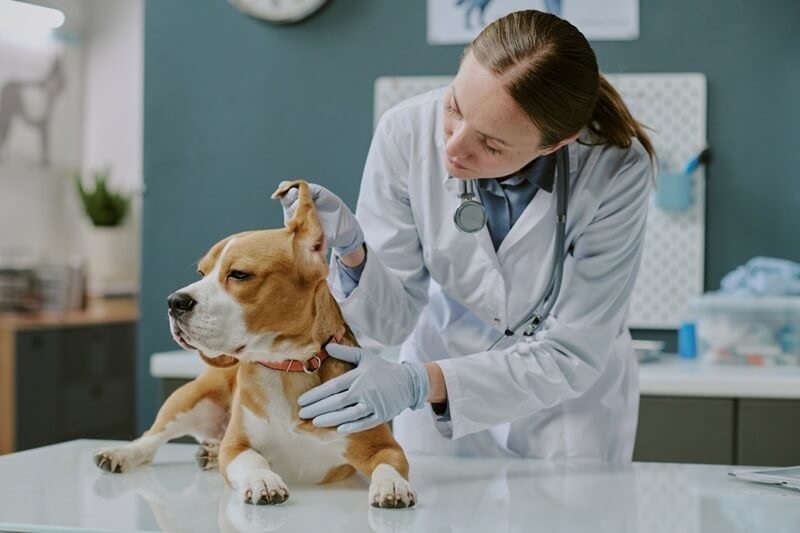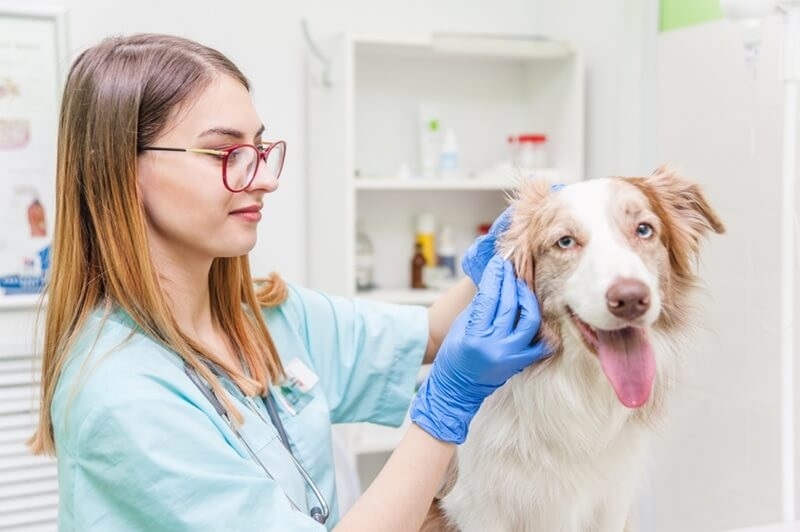
Dog ear infections are one of the most common health issues visible in pets, and recognizing early symptoms is vital to prompt restoration. Many dog owners battle detecting ear infection signs and symptoms in puppies, often resulting in delayed treatment. Knowing when to behave is essential because untreated issues may also result in chronic pain or loss. Knowing how to start treating canine ear issues early and incorporating safe herbal treatments for ear infections may protect your puppy’s comfort and well-being. Following the proper canine ear health pointers also ensures the prevention of ear diseases in the long run.
Dog ear infections occur when bacteria, yeast, or perhaps mites invade the ear canal, causing inflammation and discomfort. Because dogs have an L-shaped ear canal, particles and moisture can become trapped without issue, creating the ideal environment for contamination.
Veterinarians classify those infections into three main kinds:
Recognizing ear infection signs in puppies early lets you ensure those problems don’t develop into painful, continual situations.

Identifying early symptoms of ear contamination in dogs allows for a successful remedy. Watch for the ones in caution signs, symptoms, and signals:
If your hound displays multiple symptoms, then it is time to move quickly! Early treatment of canine ear troubles allows for preventing infections earlier than they spread deeper into the ear.
Some breeds are more prone to dog ear infections than others. Floppy-eared dogs, specifically Cocker Spaniels or Basset Hounds, periodically trap more moisture in the ears. Breeds with long, thin canals, like Shar Peis, are also more likely.
Understanding your dog’s danger factors facilitates the prevention of ear diseases and the development of tailored care routines.
When treating ear problems in dogs, time is of the essence! Mild cases can be improved through cleaning and home care, but small, medium, and large infections require veterinary treatment.
For minor infections, pup owners occasionally depend upon natural treatments for ear infections, but it’s crucial to seek the recommendation of your vet in advance before using them.
While veterinary care is always recommended for intense cases, natural remedies for ear infections can supplement treatment or help with prevention. Some options consist of:
Never insert something deep into your canine’s ear canal, and continuously verify with a veterinarian that a natural solution is secure in your pet’s circumstance.
Of course, stopping desertion is just as essential as treating it so that it does not appear again. By adding preventive care to your dog's regimen, you may reduce the risk of recurring infections or ailments.
Small, steady steps in ear hygiene move in a prolonged manner to shield long-term ear health.
Consistent canine ear fitness hints assist in preventing infections. Here are easy but powerful practices:
Combining prevention methods with professional care reduces the possibility of encountering routine canine ear infections.
Allergies are among the significant causes of ear infections in dogs. When dogs are allergic to a food or environmental trigger, inflammation in the ear canal often occurs.
Common allergies and triggers involved in the allergic response are:
The successful management of allergies, using a veterinarian-prescribed food regimen and/or antihistamines, can appreciably lessen, if not eliminate, the signs and symptoms of ear infections in puppies and cause an overall higher quality of life.
While mild signs can be managed at home, some require urgent vet care. These consist of:
Delaying treatment of superior dog ear infections can result in permanent damage or spread to other parts of the body.
Some dogs experience repeated infection, resulting in the need to care for dog ear problems long-term. Long-term care can include:
Regular treatment ensures that pets with chronic issues experience comfort and the best quality of life possible.
Food now plays a part in ear health. Foods high in omega-3 fatty acids reduce inflammation, while proper protein aids the immune system.
Pet owners can prevent their pets from having dog ear infections by:
Nutrition is the easiest of the dog's ear health methods to reduce the chances of infection.
Paw-parents often use holistic approaches with traditional medicine. These can help with self-care, as well as treat minor illnesses or reduce recurrent infections:
Combined with medications prescribed by a veterinarian, these methods provide an integrative method to treat canine ear issues effectively.
Routine veterinary appointments can help identify early signs and symptoms of ear infections in puppies. Vets can examine ear canals with special equipment, determine any underlying contamination, and provide individualized pointers for your dog's ear health.
Regular check-ups also keep vaccination, allergy testing, and skin examination up to date — further decreasing potential chronic ear problems.
Dog ear infections can cause severe pain if left untreated; however, recognizing early ear infection signs and symptoms in puppies and beginning well-timed care makes a significant difference. Whether you specialize in treating canine ear troubles, using secure natural remedies for ear infections, or educating on preventive routines, your efforts shield your pet’s comfort. Dog ear infections are one of the most common health issues visible in pets, and recognizing early symptoms is vital to prompt restoration. With consistent canine ear fitness guidelines and interest in preventing ear illnesses, you supply your canine with the remarkable risk of a healthy, satisfied existence loose from continual ear pain.
This content was created by AI